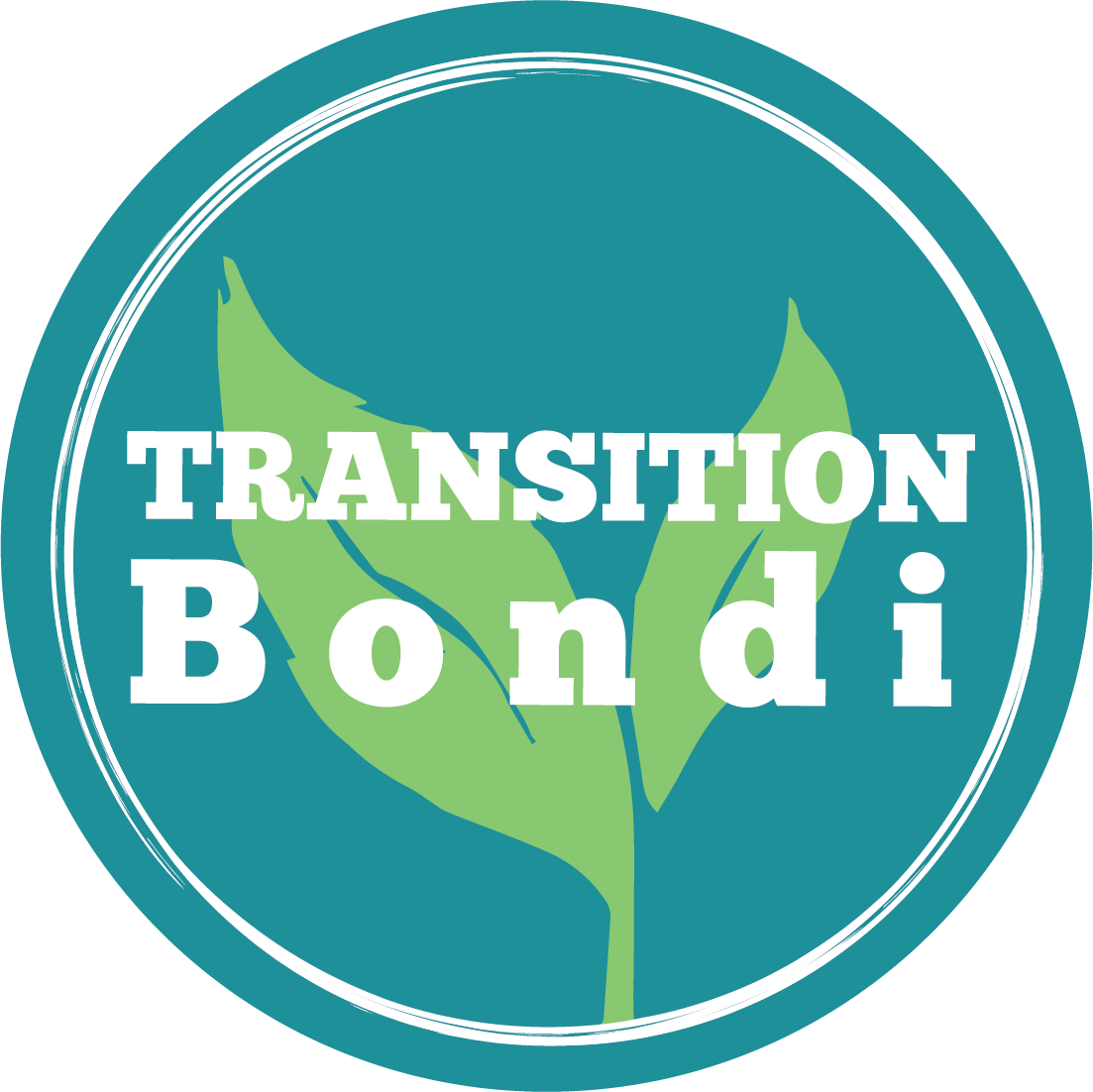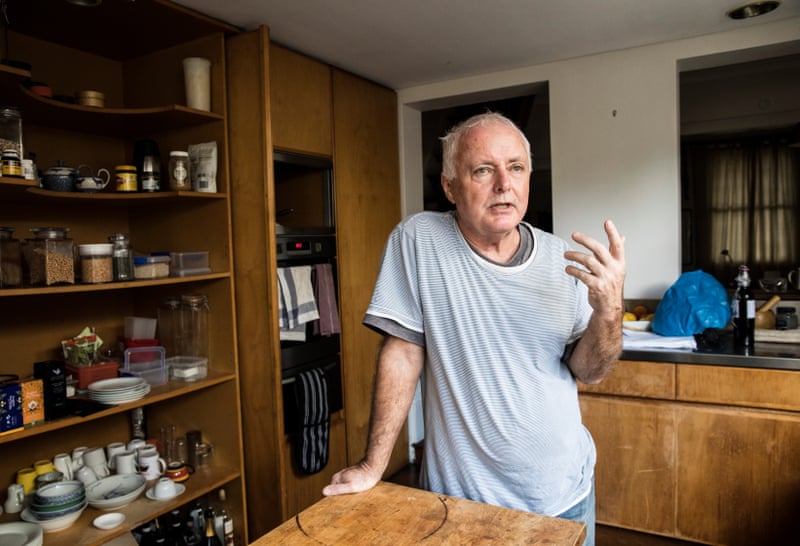Sustainability expert Michael Mobbs: I’m leaving the city to prep for the apocalypse
The man who wrote the book on living off-grid in the city plans to retreat to a rural bolthole, saying eco-friendly progress has not kept pace with the speed of climate collapse
by Janine Israel
Michael Mobbs, you might say, has been preparing for this moment his entire life.
The 69-year-old former environmental lawyer who, in 1996, converted his two-storey 19th century Sydney terrace into one of the world’s first inner-city self-sufficient homes, is selling his famous passion project and moving to a remote coastal location to prepare for what he predicts will be impending societal collapse induced by climate change.
That is, he says, a total breakdown within the next three to five years.
Selling his four-bedroom, off-grid Chippendale property that he purchased in 1978 for $23,500 and is now valued at $2.2m is proving more difficult than he thought. He’s had it on the market since March, but wants to sell it to someone who won’t convert the back yard into a car space, who wants to maintain the Saturday morning house tours that have attracted some 30,000 eco-curious visitors, and who will appreciate the home’s unique perks: two resident Australorp chooks named Pesky and Blanche d’Alpuget; less than $300 a year in water and energy bills for a family of four and a leafy street blooming with edible verge gardens.
The house also has a water, sewerage and electricity system completely disconnected from the mains: it is powered by solar panels and a battery storage system; clean drinking water falls on the roof and is then filtered for storage in an underground tank; and an aerated waste treatment system recycles all grey and blackwater, ensuring no raw sewage has left the premises in 23 years.
“Resilience and future proofing will be built in through an off-grid water and energy supply and robust materials suitable for extreme weather conditions,” explains architect and Fairweather Homes director Paul Adam. “With the climate emergency in full swing we need to create solutions that are affordable and accessible and also make a positive contribution to preventing climate change.”
It’s a project that for Mobbs is part retirement nest egg, part departing gift to a decaying planet.
Mobbs has narrowed the location for his new home to two sites in Australia: south-west Western Australia and Bermagui on the New South Wales south coast, both chosen because, to put it simply, “wherever there are trees, there is rainfall”. There are, of course, other strategic considerations (but more on that later).
First Mobbs has to do something he’s been deferring for a while: go “public”. Coming out as a survivalist who is abandoning the urban world is no easy step for a man who has authored two bestselling books on sustainable city living, spent two decades as a consultant to the public and private sector, lectured at universities, and has a model of his eco-friendly terrace home exhibited at Sydney’s Powerhouse Museum. Even his two adult children, who he says remain frustratingly indifferent to the apocalypse, aren’t fully across his intentions. “I’ve tried to crabwalk into this conversation with my children,” he says, sighing. “The idea that life won’t go on for them in the same way it has gone on for me is incomprehensible.”
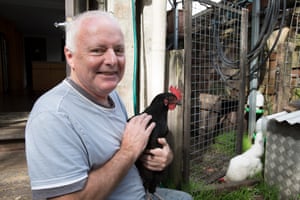
Mobbs has chosen the night before September’s global climate strike to speak his truth at a “talk and feast” event organised by the community group Transition Bondi. They have invited Mobbs to speak as part of a four-person panel on the topic, “What is your response to climate change?”
As soup is served, a real-life emergency is unfolding in the kitchen. An overheated kettle has triggered the fire alarm, forcing everyone to file out of the Margaret Whitlam Recreation Centre at Waverley Oval to the repetitive strains of “Emergency, emergency! Evacuate now!”
When the kettle has finally been pacified, Mobbs and the panel take their positions. Mobbs is no stranger to public speaking – quick with a quip and with a lawyer’s gift for the gab – but tonight he’s nervous, clutching printed notes which he reads from slowly.
“My guess is water, energy, food, the seasons and economies will collapse in the next three to five years,” he says. “Am I certain of these things? No. But like someone diagnosed with a cancer expected to kill me in the next five years, I am now preparing for my personal circumstances over the next few years. The star I steer by is an article by Catherine Ingram, Facing Extinction.”
People seem to believe that if they have superannuation, climate change won’t apply to them
The audience – who were hoping for a side of hope with their vegan meal – appear stunned. Mobbs, on the other hand, looks relieved.
Speaking to Guardian Australia in the days leading up to and following his big reveal, Mobbs admits he sometimes has moments of doubt, where he wonders if he’s just catastrophising. But he reserves most of his incredulity for people who refuse to believe it could happen here.
“I don’t debate it any more – it’s just a waste of time. What they’re saying is: ‘I find this too hard to talk about. I don’t want to listen to your point of view,’” he says.
It reminds him of the resistance he encountered when he took his inner-city home off grid – the naysayers, the builders, the hydraulic engineers, the local government officials who said it could never be done.
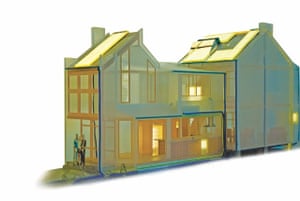
We’re sitting near the fireplace in Mobbs’ Myrtle Street terrace looking out through large glass doors to the landscaped back garden with its small beehive, kumquat trees and homes for micro bats. Mobbs is talking about “collapse”, which he fears, when it strikes, could unfold very quickly.
“I want to get away from the major cities because I think they’ll become unsafe. You look at what happens in places that get cyclones or tornadoes; when the food runs out and it’s hard to get power and water, civil unrest happens in about two or three days,” he says.
“People die without food and water in a week, and if there are a lot of people dying or at risk of dying, their behaviour will become uncontrollable.”
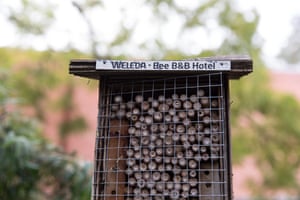
The nation-state, he believes, won’t come to the rescue. “They will look after themselves and their own. They will appropriate resources to protect their own entitlements. They won’t look after the people who voted for them.”
Even this Sydney house won’t withstand the coming crisis, Mobbs says – a point, I suggest, he probably shouldn’t stress to a prospective buyer.
He throws his head back and laughs. “I suppose I could put up a warning note: ‘Staying here is life-threatening.’”
Still, he believes those in the city who are more self-sufficient, including the future occupants of this house, will have an advantage. “[But desperate people] will come here for the water and the energy,” he says, adding drily: “Maybe I should sell it with guns.”
When, or if, such a situation arises, Mobbs wants to be well off the radar. Does he see himself as a doomsday prepper?
“Yeah, I’m looking after me – I want to survive. I doubt that I will because it’s hard to say where the water will or won’t fall.
“I’m trying to find somewhere, where even if the great conveyor belt does break down while I’m alive, there are enough trees to out-arm wrestle the ocean and retain the rainfall.”
Enter Bermagui, the frontrunner for his haven from climate disaster. The town of 1,500 people flanked by ocean and forest and midway between Sydney and Melbourne first came to his attention during a chance encounter with chef turned urban farmer Paul West, who hosts the Foxtel series River Cottage Australia.
“We did this gig together for Whitehorse City Council [in Melbourne]. Within 10 minutes we were talking like you and I were talking. He said ‘I’m moving out of my Melbourne house and back to Bermagui.’ He said ‘Come to Bermagui. It’s got two wooden bridges which could be burned down should the town need defending.’ I thought, ‘This is my man!’”
Mobbs’ annihilation anxiety can be traced back to his childhood. He grew up on a farm downstream from Forbes in the NSW central west. When he was six the Lachlan River flooded, cutting him and his family off from the world for four months, leaving them reliant on food drops from a Gypsy Moth biplane. It was young Mobbs’ first “experience of the power of water”, giving him an enduring “respect for the unpredictability of the weather”.
A number of factors coalesced in the last year to rekindle Mobb’s unease. With his children flown the coop and his marriage long over, he decided to rent out his Chippendale home for a year and relocate to Bondi Beach so he could swim in the ocean at dawn and “see who I was when I wasn’t that guy in that house”.
Three months after the move the UN Intergovernmental Panel on Climate Change released its dire report warning the world only had 12 years to avert a climate catastrophe.
It’s hard to work out how to live in the face of impending collapse.
Standing at sunrise on the golden strip of sand that lures millions of people each year, Mobbs saw a culture that “simply can’t be sustained”.
“Bondi is a kind of Andy Warhol picture writ large of good figures and narcissism at every second step,” he says. “And I found [my sustainable house] was put in perspective, I saw myself as quite an aberration – just alone with millions of people who have no concept of what the realities are and think that they have time … They seem to believe that if they have superannuation, climate change won’t apply to them.”
During that year Mobbs also took a 4,352km train trip from Perth to Sydney, a journey he describes as “just four days of dying countryside”. “I travelled through Western Australia across the Nullarbor, through South Australia, down through Broken Hill – the whole of the country is abandoned and dying,” he says.
That the mighty, flood-prone Lachlan River of his youth has now been projected by WaterNSW to run dry by March 2020 given no significant rain or government intervention, fills Mobbs with a grave fear.
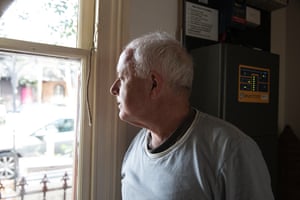
When NSW premier Bob Carr opened Mobbs’ sustainable house on 9 December 1996, he declared Sydney’s first self-sufficient home “a vision of the future”.
Indeed, at last count, more than 20% of Australian homes were fitted with solar panels; this year’s national Sustainable House Day saw 252 homes open their doors to the public; and NSW now has a building sustainability index (Basix) that regulates the energy and water efficiency of new dwellings.
In those two decades Mobbs has had significant wins against the state, including Sydney Water, which for years after he’d disconnected his home from the sewage and water mains continued to send him bills (when he didn’t pay up, he says, they threatened to disconnect him). “[Eventually] they came round and did a smoke test. And their faces fell,” he says, grinning.
But Mobbs is still locked in an ideological battle with Sydney Water, which he sees as prioritising desalination plants over home rainwater tanks and wastewater recycling systems. The dwindling H2O levels in his own underground storage system is a daily reminder of the city’s water insecurity – in recent years he’s had to increasingly rely on his neighbour’s garden hose to top up his tank. The latest worst-case scenario projection from WaterNSW is that Warragamba Dam – Sydney’s primary water supply – will stop flowing by January 2022.
“I’ve done my best here and it hasn’t been enough,” Mobbs says of his Sydney ecohome. “I see what I’ve done as a failure. Not a tragic failure – I mean it’s changed things such as building regulations … This house has brought more change than political argument has. I’ve given up political strategising. The political process is just too slow for the problems we face. I’m hoping if we can do a good job with this [prefabricated sustainable home] project, we can achieve change.”
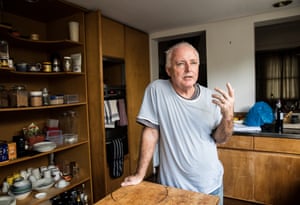
Next week Mobbs will jump on a bus (he doesn’t own a car) at Central Station and travel eight hours south of Sydney to Bermagui to look for land to buy and establish contacts in a patch of NSW he foresees will be his next home.
“Is Bermagui somewhere I want to go?” he says. “Sort of yes, sort of no. Somebody gave the analogy of the Jews in Germany [before the Holocaust]. They said there were three types of Jews: those who said ‘We can’t trust [Hitler], we’re leaving.’ There were people who said ‘I think we can manage him and bring him round.’ There were others who said ‘It’ll never happen to us, we’ll be right.’ And the same forms of denial and acceptance are in the conversations I’m having now.
“It’s hard to work out how to live in the face of impending collapse and my solution – aside from whisky and wine and gardening – is to do things that have meaning for others and to show faith that it’s possible to do this stuff.”
***
One September evening, Sydney’s long dry spell breaks. Days of downpours follow, during which Mobbs monitors with a childlike joy as his 10,000 litre back yard inner-city rainwater tank fills to 96% capacity.
One morning that week I receive an email. “Beautiful sound of rain on my tin roof as I write this. More than ever the sound is so gratifying,” he says.
He signs off the email with a simple message, but on that saturated morning it rings like a prayer for a parched country.
“May the raindrops be with you.”
Article originally published by The Guardian
